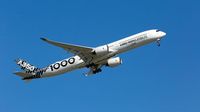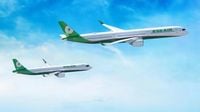During the Aircraft Interiors Expo (AIX) in Hamburg, Germany, Airbus unveiled a series of innovative developments in interior design and passenger experience on April 8, 2025. Among the highlights was the introduction of a luxurious new first-class suite for the A350-1000, which promises to elevate the travel experience for passengers seeking the utmost in comfort and space.
The new first-class suites, which offer more space than those on the upper deck of an A380, are part of Airbus's broader strategy to meet the growing demand for premium travel options. The company noted that the new suites can be customized to meet the specific needs of airlines, featuring amenities such as a private bathroom, a changing room, and a mini-bar. This flexibility allows airlines to tailor the experience to their brand and customer expectations.
Airbus's first-class offering is part of its flagship product, Allegris, which has already been fitted on ten of its A350-900 aircraft. The new suites are designed to enhance the overall passenger experience, reflecting a trend in the aviation industry that sees a strong demand for first-class accommodations.
In addition to the first-class suite, Airbus announced that the A220 aircraft family would be joining the Airspace cabin family starting in early 2026, with Air Canada set to be the launch customer. The Airspace cabin on the A220 will incorporate new design elements, including the widest seats, aisles, and largest windows in its class.
Airbus has made significant improvements to the A220's cabin, including new overhead bins, branded as Airspace XL bins, which offer 20% more volume and are 10% lighter than previous models. These enhancements will not only improve passenger comfort but also facilitate quicker turnaround times for flight crews due to their easier handling.
John Moody, the Managing Director of Onboard Product at Air Canada, expressed enthusiasm about the new developments, stating, “At Air Canada, we’re always looking for opportunities to evolve our products and make travel more comfortable and convenient. The introduction of larger overhead bins on future A220s means more space for your belongings, quicker boarding, and an even better experience on board.”
Moreover, the new cabin design is expected to reduce the overall weight of the cabin structure by approximately 300 pounds (136 kilograms), leading to further efficiencies.
Airbus also announced a partnership with Amazon to enhance its in-flight connectivity offerings. This collaboration focuses on integrating Amazon's satellite internet network, Project Kuiper, into Airbus's aircraft. The initiative aims to provide high-speed, low-latency connectivity options to airlines and their passengers, addressing the increasing demand for reliable internet service during flights.
Tim Sommer, the Vice President and Head of the Connected Aircraft Program at Airbus, shared his excitement about the partnership, noting that it will bring new satellite connectivity options to the aviation industry. Amazon's Project Kuiper plans to deploy a constellation of over 3,200 low Earth orbit (LEO) satellites, which will enhance in-flight connectivity for passengers.
In a related development, Taiwanese airline EVA Air has placed a firm order for six long-range A350-1000s and three single-aisle A321neo aircraft, following a commitment announcement in March 2025. This new order increases EVA Air's backlog to 24 A350-1000s and 18 A321neo aircraft, solidifying its position in the competitive aviation market.
The A350-1000 is notable for its long-range capabilities, able to fly up to 9,700 nautical miles (18,000 kilometers) non-stop while consuming 25% less fuel than previous generation models. This aircraft is powered by the latest generation of Rolls-Royce engines and is designed to operate with up to 50% sustainable aviation fuel (SAF). Airbus has set an ambitious goal of having its aircraft capable of using 100% SAF by 2030.
Clay Sun, President of EVA Air, commented on the significance of the new order, stating, “The new additions to our fleet reaffirm our commitment to sustainable aviation and delivering an exceptional travel experience. Both the A350-1000 and A321neo set a high standard in their respective categories, offering remarkable efficiency and comfort to our passengers.”
Benoît de Saint-Exupéry, Airbus's Executive Vice President of Sales for the Commercial Aircraft Business, added, “EVA Air’s new orders underscore the enduring appeal of the A350-1000 Long Range Leader as the benchmark for intercontinental operations, and the A321neo as a leader in regional efficiency. We deeply value EVA Air’s confidence in these latest generation aircraft and stand ready to support their seamless integration into the airline’s fleet for future success.”
As airlines like Air Canada and EVA Air embrace these advancements, the aviation industry is poised for a transformation that prioritizes passenger comfort, sustainability, and connectivity. With Airbus leading the charge, the future of air travel looks brighter and more connected than ever.





